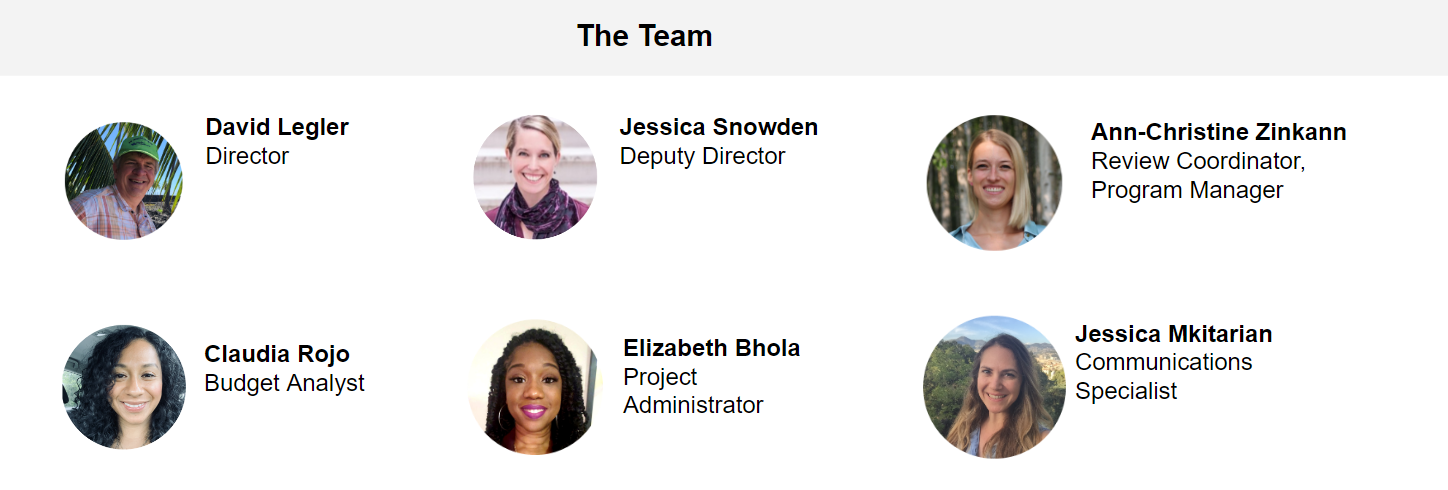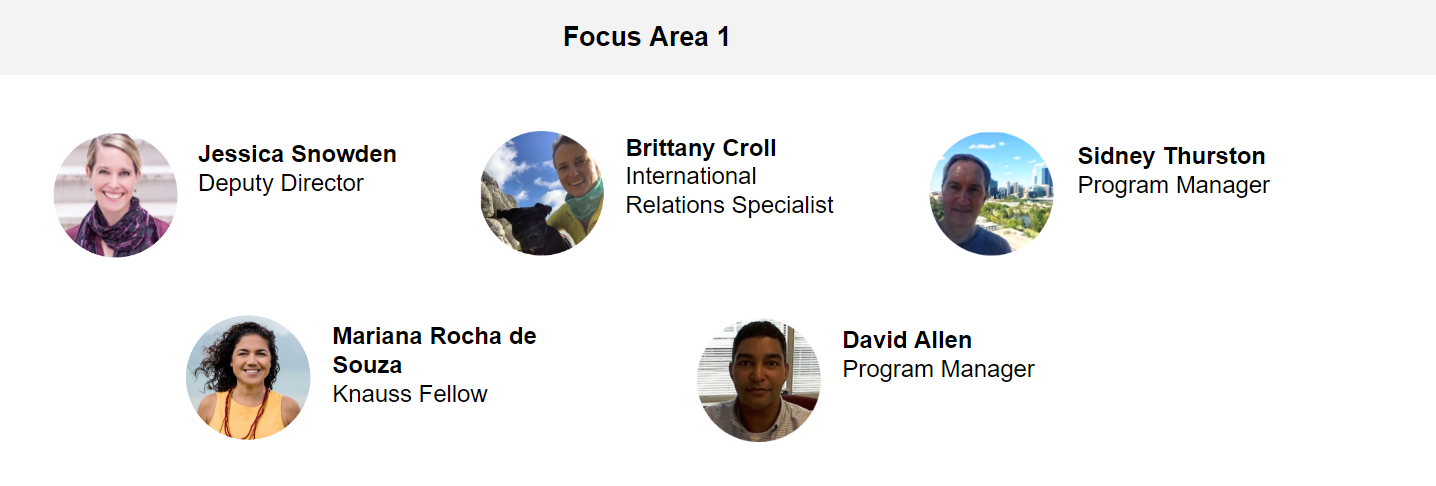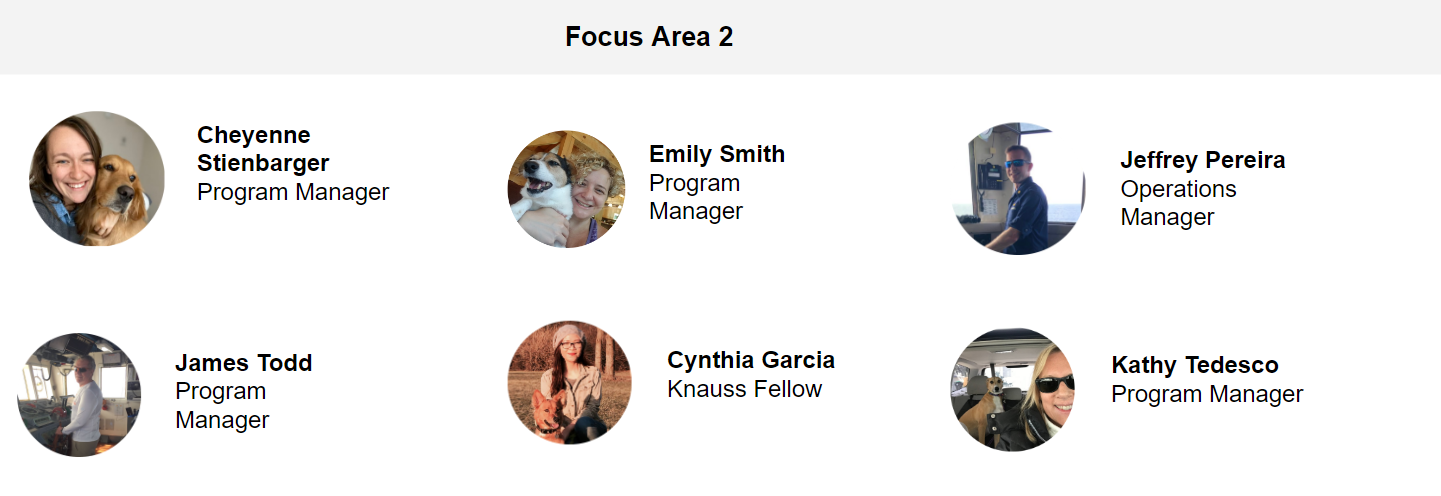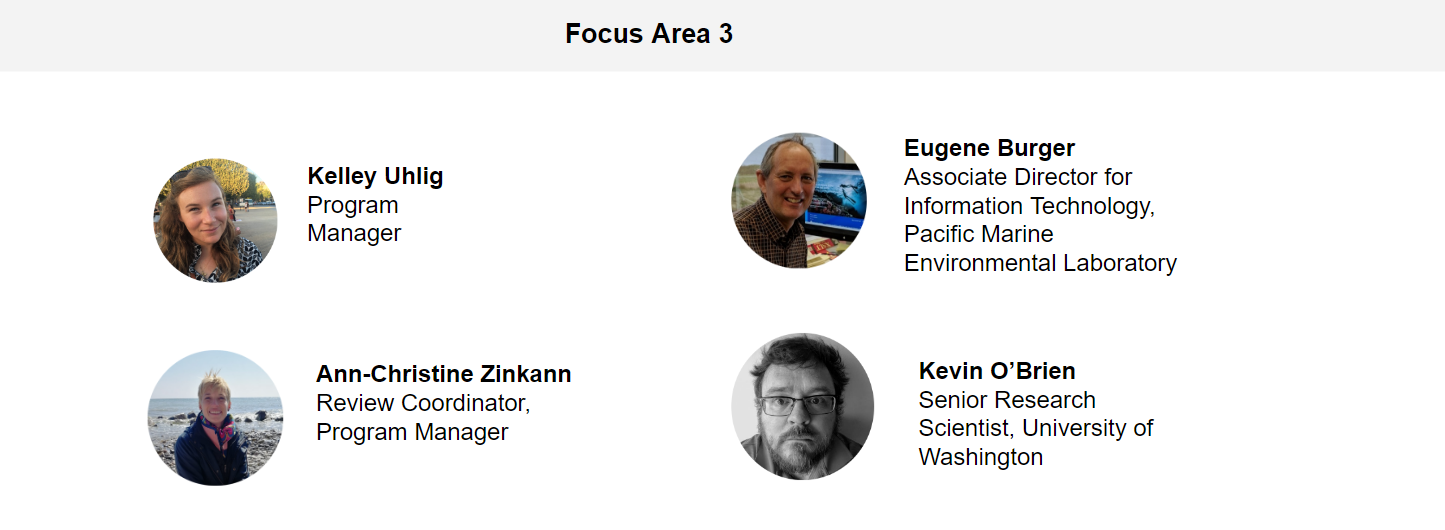GOMO PROGRAM REVIEW

July 11 - 14, 2022
The Review
Reference the Charge to Reviewers (PDF).
Read the Final Program Review Report (PDF).
Read the Program Review Response Plan from the GOMO team (PDF).
Program reviews are conducted every five years to evaluate the quality, relevance, and performance of research conducted in the National Oceanic and Atmospheric Administration (NOAA) Office of Oceanic and Atmospheric Research (OAR). This review is for both internal OAR/NOAA use for planning, programming, and budgeting, and external interests and helps the Program in its strategic planning of future research activities. These reviews are intended to ensure that OAR research is linked to the NOAA Research mission and priorities, and other relevant strategic plans and to ensure that research is of high quality as judged by preeminence criteria, and is carried out with a high level of performance.
This will be GOMO’s first Program Review and will serve to inform future planning, budgeting, internal and external interests and connections. This review will cover the program activities of GOMO over the last five years (2017-2021). The three focus areas for the review are:
- Focus Area 1: US leadership of an ocean and Arctic observing research enterprise
- Focus Area 2: Frontiers in ocean observing
- Focus Area 3: Information and product development to ensure data access and usability; and to increase the value/impact of ocean observations
Planning Team
Review Panel
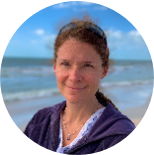
Review Chair: Dr. Laura Lorenzoni
Program Scientist for the Ocean Biology and Biogeochemistry Program Science Mission Directorate at the NASA Headquarters Science Mission Directorate, USA
Laura Lorenzoni is a Program Scientist for the Ocean Biology and Biogeochemistry Program (OBB) in the NASA Headquarters Science Mission Directorate. The OBB program focuses on describing, understanding, and predicting biological and biogeochemical conditions, interactions and changes in the upper ocean, as determined by observation of aquatic optical properties using remote sensing and in situ data.
Laura completed her undergraduate in Biology at the Universidad Simon Bolivar (Venezuela), and subsequently earned both her Master’s and PhD degrees in Marine Science at the University of South Florida. Her research interests include land-ocean interactions, and the influence of rivers on transport and distribution of dissolved and particulate organic matter in the coastal ocean. For over a decade, she worked with the CARIACO Ocean Time-Series project, and has been an advocate of time-series (in situ ship-based and autonomous, as well as satellite remote sensing) as tools to understand natural and anthropogenic changes in the ocean.
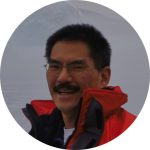
Dr. Craig Lee
Senior Principal Oceanographer, Professor of Oceanography, Applied Physics Laboratory, University of Washington, USA
Craig Lee is a physical oceanographer specializing in observations and instrument development. Lee founded and leads a team of scientists and technologists that pursues a wide range of research including studies of small-scale dynamics, physical-biogeochemical interactions, atmosphere-ice-ocean dynamics and Arctic change. An important component of this work involves developing new instruments and approaches to collect novel observations, including long-endurance gliders, autonomous platforms for operation in ice-covered waters, high-performance towed vehicles and light-weight, inexpensive mooring technologies. The team is the development group behind the Seaglider family, one of the three operational long-endurance glider designs. Lee provides leadership through service on the science steering committees, by serving on and chairing advisory panels and through briefings provided to federal and international bodies.

Dr. Patrick J. Hogan
Ocean Sciences Branch Chief for the National Centers for Environmental Information, NOAA, USA
Dr. Patrick Hogan is the Chief of OGSSD’s Oceanographic Sciences Branch. He manages a Product and Services Portfolio that covers a wide spectrum of oceanographic topics, ranging from Living Marine Resources to Arctic Assessments. Prior to coming to NOAA in 2020, Pat worked at the Naval Research Laboratory (NRL) where he was the head of the Open Ocean Processes and Prediction Systems Section for 12 years and the Lead Principal Investigator (PI) on research projects funded at over $13M during the last 10 years. At NRL, he was leading a team working on ocean dynamics and ocean data assimilation in concert with global ocean prediction systems that transition to the operational U.S. Navy. Patrick has also worked closely with the ocean glider community through Rutgers University and participated in the US ARGO Review. Patrick is a member of the OceanPredict Science Team (previously GODAE); Board Member (elected) of the Gulf of Mexico Coastal Ocean Observing System (GCOOS); Member, Integrated Ocean Observing System (IOOS); and holds an adjunct faculty position at the University of Southern Mississippi. Patrick earned his Ph.D., in Marine Sciences from theUniversity of Southern Mississippi and holds a Masters Degree in Geology and Geophysics from the University of New Orleans and a B.S. in Geology from the University of Kansas.
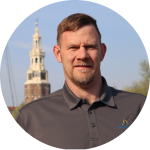
Mr. Justin Manley
Founder at Just Innovation Inc and President-Elect at Marine Technology Society, USA
Justin Manley is an innovative technologist and executive with experience in commercial, academic, and public sectors. He has been working with marine technology, especially uncrewed systems, since 1990. He worked with autonomous vehicles at the Massachusetts Institute of Technology from 1993 to 2002. Between 2002 and 2009 Mr. Manley provided marine technology consulting services, primarily to the National Oceanic and Atmospheric Administration.
In 2009 Mr. Manley transitioned to the private sector, joining Liquid Robotics during its startup phase. There he was responsible for developing new commercial and scientific programs. In 2011 he joined Teledyne Benthos where he managed a diverse product portfolio and led the development of a networked systems strategy across Teledyne Marine Systems (Benthos, Webb Research, Gavia, and SeaBotix).
Drawn back to entrepreneurial endeavors, Mr. Manley founded Just Innovation Inc. in 2015. He advises clients including startups, multinational corporations, investors, and philanthropies with technical interests in uncrewed vehicles, robotics, sensors, and undersea systems. Mr. Manley offers clients support with strategy and innovation, business and product development, evangelism, and marketing.
Mr. Manley is extensively involved in the marine technology profession. He is a Senior Member of IEEE, a Life Member of the Marine Technology Society (and President-Elect for 2020-2021), a Fellow of the Institute for Marine Engineering Science and Technology (IMAREST), a founding member of the U.S. Integrated Ocean Observing System (IOOS) Advisory Committee, and current member of the NOAA Ocean Exploration Advisory Board (OEAB). He is dedicated to innovation, mentoring startup companies, and serving as a judge for the XPRIZE Foundation. He holds two patents in the area of uncrewed systems oversight and security.
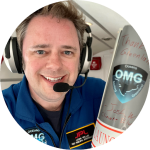
Dr. Josh Willis
Lead Scientist, NASA, USA
Josh Willis is the lead NASA scientist for the satellite missions that measure sea level, Jason-3 and Sentinel-6 (https://sealevel.jpl.nasa.gov). He is also the Principal Investigator for the airborne NASA mission Oceans Melting Greenland (OMG, https://omg.jpl.nasa.gov). OMG was a 6-year experiment to understand the extent to which the oceans are melting Greenland’s ice from below. Willis has worked at NASA’s Jet Propulsion Laboratory as a Climate Scientist since 2006, and as a postdoc since 2004. His research interests include understanding the ocean’s role in climate change, the causes of sea level rise, and the interaction between the oceans and the Greenland ice sheet. His CV is available at https://science.jpl.nasa.gov/people/Willis/.
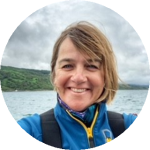
Dr. Katy Hill
UK G7 Marine Science Coordinator, National Oceanography Centre, UK
Katy is the UK G7 Marine Science Coordinator, funded by the UK Government, and part of the G7 Future of the Seas and Oceans Initiative Coordination Centre. The FSOI is focused on strengthening the sustained observing system, identifying and promoting priorities for coordinated action and investment across the G7. The coordination centre is responsible for implementing the agreed G7 work plan and she is also acting as focal point for UK coordination and engagement in G7 activities across programmes, funding agencies and government representatives. Recently Katy served on the review committee of the EuroGOOS programme, and was also an invited author for the European Marine Board Policy Brief on Sustaining In Situ Ocean Observations in the Digital Age.
Previously Katy worked for the Global Climate Observing System (GCOS) and the Global Ocean Observing System (GOOS) and managed GOOS’s relationship with the World Meteorological Organisation (WMO). She was responsible for overseeing the requirements, design and evaluation of the ocean observing system for physics and its delivery to climate and operational applications. Katy oversaw the establishment and delivery of the Tropical Pacific Observing System 2020 project, to transform the design of the observing system, successfully engaging new partners. She also led the development of a WMO ocean position paper which highlighted the need for effort to be focussed on understanding, monitoring and predicting the ocean in order to achieve the objectives outlined in the WMO Strategy. Prior to that, Katy played a central role in Australia’s Integrated Marine Observing System from its inception. The initiative brought about a step change in Australian observing capability as IMOS grew into a coherent, interdisciplinary national programme, with strong community ownership and an important contributor to GOOS and GCOS. As Scientific Officer, Katy worked with a broad range of marine programmes and organizations to develop a National Science and Implementation Plan which identified priorities for investment, and underwent international peer review. In parallel Katy was responsible for engaging with the potential users of IMOS observations to ensure the programme realized its impact potential.

Dr. Pier Luigi Buttigieg
Senior Data Scientist, GEOMAR Helmholtz Centre for Ocean Research, Germany
Pier Luigi Buttigieg is a Digital Knowledge Steward and Senior Data Scientist at the GEOMAR Helmholtz Centre for Ocean Research. His professional mission is to use data science to bridge our increasingly digitized ocean community across science, operations, and policy. Concurrently, he researches and develops operational-grade and internationally adopted knowledge representation technologies for ecology, planetary science, and – in collaboration with UN Environment – the Sustainable Development Goals. He also focuses on developing distributed and interoperable digital systems from sub-national to global scales, through work with the Earth and Environment Hub of the Helmholtz Metadata Collaboration and the International Oceanographic Data and Information Exchange (IODE) of UNESCO’s Intergovernmental Oceanographic Commission (IOC). In these latter roles, he is co-leading the deployment of the IODE Ocean and Data Information System (ODIS) and Ocean InfoHub to enable regional stakeholders to co-develop a digital commons for the global ocean. He also serves on several other regional and international advisory boards, supporting the growth of a diverse but harmonized digital ocean ecosystem.

Dr. Ichiro Fukumori
Physical Oceanographer at the Jet Propulsion Laboratory, California Institute of Technology, USA
Ichiro Fukumori is a physical oceanographer at the Jet Propulsion Laboratory, California Institute of Technology. He has over 30-years of research experience studying large-scale ocean circulation with a focus on sea level change. Fukumori has pioneered in the development of practical methods of data assimilation and has advanced their application in studying various mechanisms of the ocean (e.g., Kalman filtering and related smoothing, adjoint models). Fukumori is a founding member of the Consortium for “Estimating the Circulation and Climate of the Ocean” (ECCO; https://ecco-group.org) producing global estimates of the physical state and processes of the ocean by combining observations with state-of-the-art models.
